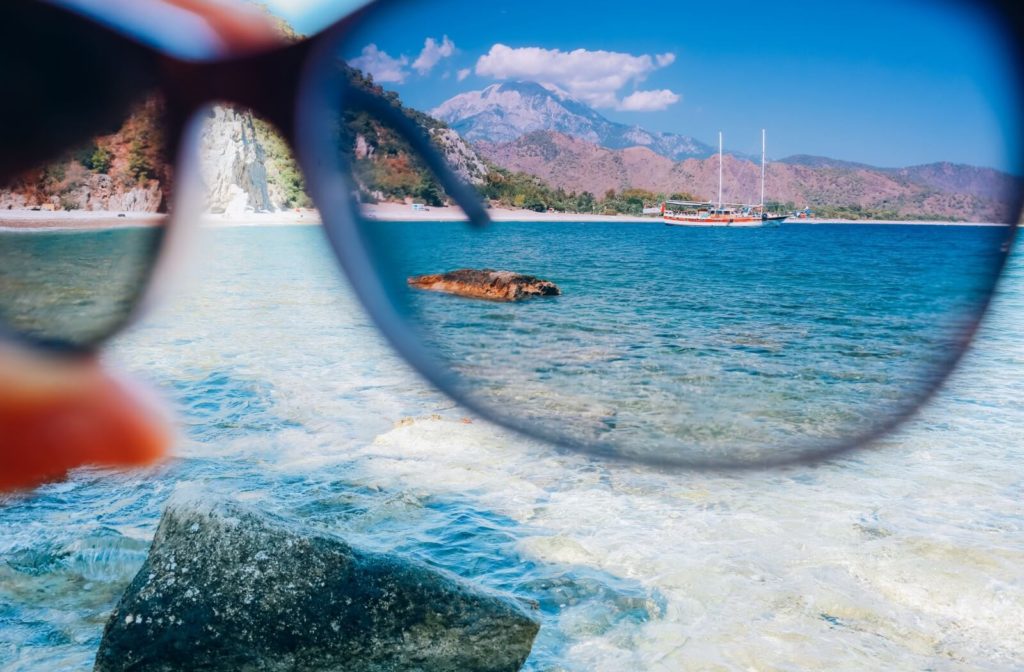If you’re an individual who spends a lot of quality time outdoors you’ve likely heard the term “polarized” thrown around in conversation. But, what does this term mean exactly?
Polarized lenses refer to specialized tinted lenses that help reduce glare, enhance depth perception, and vision, and can make certain colors more vibrant and saturated. Polarized sunglasses go a step further and provide added sun protection on top of all of these features.
Polarized sunglasses provide sun protection in addition to glare reduction.
Traditional sunglasses provide sun protection but glare isn’t significantly reduced. Whereas polarized eyeglasses reduce glare but don’t supply adequate sun protection.
Depending on your lifestyle, polarized sunglasses offer additional benefits when compared to traditional sunglasses and polarized eyeglasses.
Importance of Sun Protection
Sunlight is important for energy and vitamin D, but in addition to its benefits, sunlight is harmful to our eyes because of its UV rays. The sun emits UVA and UVB rays, both of which affect the health and function of our eyes.
UVA rays penetrate the eye and can damage the macula, a structure of the eye responsible for central vision. UVB rays generally impact the front of our eyes (the lens and corneal tissue) and can cause conditions like photokeratitis, a type of sunburn for the eye.
Sun damage to the eyes is gradual and symptoms may not be immediately noticeable.
Consistent sun protection and routine eye exams are crucial for preventing and detecting any signs of sun damage.
Symptoms of sun damage to our eyes can include:
- A spot in the center of your vision
- Blurry vision
- Difficulty focusing
- Headaches
Consistent sun exposure without adequate protection can increase one’s risk of developing certain eye conditions, such as:
- Age-Related Macular Degeneration (AMD)
- Cataracts
- Eyelid Cancer
- Photokeratitis
How UV Protection Helps Prevent Sun Damage
UV protection works to keep the eyes safe from sun damage by blocking or absorbing harmful ultraviolet radiation.
UV-protective eyewear, such as sunglasses can work one of two ways:
- Absorbing UV rays before reaching the eyes
- Reflecting UV rays away from the eyes
When shopping for sunglasses, look for labels or tags indicating “100% UV protection” or “UV400,” which means the lenses block all UVA and UVB rays
What Are Polarized Sunglasses?
Polarized sunglasses are designed to reduce glare from surfaces like water, snow, and pavement. This is achieved through a special chemical film applied to the lenses, that provides a tint that filters out horizontal light waves that cause glare, providing clearer vision and reducing eye strain.
This specialized coating on polarized sunglasses goes a step further and can block UVA and UVB rays, safeguarding your eyes from these damaging effects while simultaneously reducing glare.

Benefits of Polarized Sunglasses
Polarized sunglasses enhance visual comfort and clarity.
They reduce glare, which can be particularly beneficial when driving or participating in outdoor activities like fishing or skiing. Improved contrast and visibility mean you can see your surroundings more clearly, even in bright conditions.
For individuals who live an outdoorsy, active lifestyle, and are frequently exposed to bright sunlight and reflective surfaces, polarized sunglasses are an excellent choice. However, polarized sunglasses aren’t as suitable for those on digital screens. The polarized technology alters the visibility of digital screens, causing them to appear dark or completely black.
Ultimately, polarized sunglasses provide several benefits as they significantly reduce eye strain, improve visual comfort, and offer protection against UV rays compared to non-polarized lenses.
The Advantage of Polarized Sunglasses
When it comes to sun protection, polarized sunglasses offer distinct advantages over both traditional sunglasses and polarized lenses.
Polarized Sunglasses vs Traditional Sunglasses
When considering sun protection, the distinction between polarized sunglasses and regular polarized glasses becomes quite important. Polarized sunglasses are specifically engineered to provide both glare reduction and UV protection.
Traditional sunglasses are usually non-polarized, reduce overall brightness, and provide UV protection but, they don’t reduce glare and enhance color like polarized sunglasses.
While traditional sunglasses shield your eyes from harmful UV rays and reduce light intensity, they may not offer the same level of visual comfort and clarity in high-glare situations as polarized sunglasses do.
Traditional sunglasses that offer 100% UV protection are great for individuals who require daily sun protection, instead of specialized lenses for outdoor activity.
Polarized Sunglasses vs Polarized Eyeglasses
Polarized eyeglasses still have a tint to their lens, to block intense reflected light to reduce glare, but this doesn’t make them sunglasses.
Polarized lenses alone don’t offer adequate UV protection even though the lenses are tinted. However, you can purchase polarized eyeglasses with UV protection, such as polarized sunglasses.
Polarized glasses are a great option for individuals who’d like to reduce glare from light reflection for outdoor activities, like fishing, snowboarding, and driving. However, if UV protection is a priority during these outdoor activities, polarized sunglasses are the better option.
Explore our Frames
Adequate sun protection for our eyes is important for maintaining healthy vision and eye health. Polarized sunglasses include benefits like glare reduction, enhanced vision, color saturation, and UV protection that polarized eyeglasses and traditional sunglasses can’t provide.Connect with our team at 2020 Eyecare Ohio to browse our selection of eyewear and lenses.



